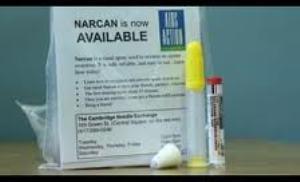Consequences of Prohibition
Drug War Issues
Politics & Advocacy
State officials in Massachusetts announced Tuesday that the state's pilot Narcon (naloxone) pilot program has marked the 1,000th overdose reversal since the program was introduced in 2007. The program is part of a broader effort undertaken by the Department of Public Health, its Bureau of Substance Abuse Services and its Bureau of Infectious Disease Control to reduce fatal and non-fatal opiate overdoses.

Narcan is saving lives in Massachusetts. (image courtesy Cambridge OPEN)
"Too many families have been impacted by the rise in opiate abuse and overdoses in Massachusetts," said Lieutenant Governor Timothy Murray, Chair of the Interagency Council on Substance Abuse and Prevention. "As we continue to combat opiate abuse and provide resources for prevention and treatment services, Narcan has proven to be a powerful tool in saving lives, so that opiate abusers can receive treatment and begin to recover from their addiction."
"Massachusetts is a national leader in opioid overdose prevention," said Secretary of Health and Human Services JudyAnn Bigby, MD. "By using community-based programs to enroll participants and distribute Intra-nasal Narcan, this pilot has allowed us to reach opioid users and bystanders in communities across the state."
Intra-nasal Narcan is available at pilot sites located in 12 Massachusetts cities, including Boston, Brockton, Cambridge, Fall River, Gloucester, Hyannis, Lynn, New Bedford, Northampton, Provincetown, Quincy and Springfield. The pilot sites provide education on overdose prevention, recognition and response to opiate users and family and friends of opiate users, along with referrals to treatment. Click here to learn more.
This work by StoptheDrugWar.org is licensed under Creative Commons Attribution-ShareAlike 4.0 International
Comments
This has to be expanded
It's so obvious that naloxone should be widely available and that anyone who uses opiates and their families must be educated on it. Every doctor that prescribes an opiate should prescribe naloxone along with it and educate the patient about it, and anyone who is using opiates illegally should be able to get a prescription for it from a doctor. In fact, as far as i understand it's not a dangerous substance at all (anyone correct me if i'm wrong about that), and it doesn't get you high. Considering this, it should be available over the counter and people (in fact, even kids in school who are being drug-educated) should be informed about it. There has been a big increase in prescription drug overdoses in the last few years and it's absurd that that should even happen.
In reply to This has to be expanded by TrebleBass (not verified)
BTW
I think its even a good idea in the sense that if a doctor tells someone, "here, this is percocet. In case you take too much, i'm gonna give you this naloxone too, so you and your family can try and make sure you don't die", they will realize that they have to take it seriously and will probably have less probability of overdosing in the first place.
Dexmedetomidine for cocaine
Cocaine overdoses can apparently be reversed by a drug called dexmedetomidine. They did a study in 2007 that showed the drug can revert the effects of small doses of cocaine, both in the nervous system and in the cardiovascular system. Apparently they have yet to determine whether it works on larger doses, but it seems likely that it should (i'm saying that, the researchers didn't say that). A good thing about dexmedetomidine is that it doesn't cause respiratory depression. I assume that that makes it a better candidate for treating cocaine overdoses (than other depressants) because when the coke has been mixed with depressants, it won't cause the person to die of respiratory depression (although cardiovascular depression might still happen i guess. any doctors out there or anyone who knows, i'd be happy to hear if you think that makes sense). Anyway, if all this makes sense, this drug should also be available by prescription to cocaine users. I don't know about over the counter (at least not yet because i guess it might be dangerous). Btw, there is another thing that reverses the effects of cocaine overdose that is also a vaccine. I don't remember what that's called, but this is much better because if you're having an overdose, you don't have to take (or be given) a vaccine just to try to save your own life. I'm not against people using a vaccine if they want to, but not as a way of stopping an overdose as long as dexmedetomidine can be used instead.
Add new comment